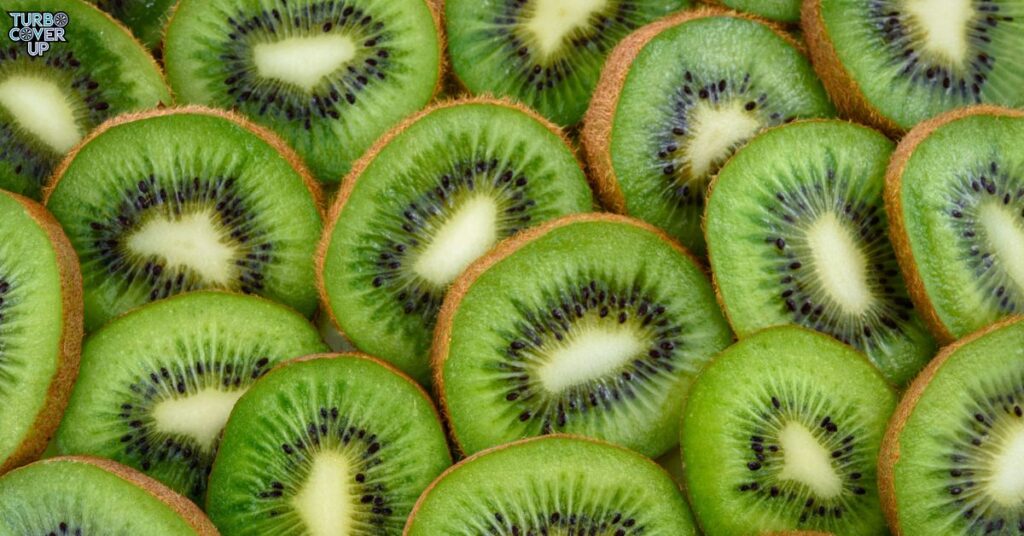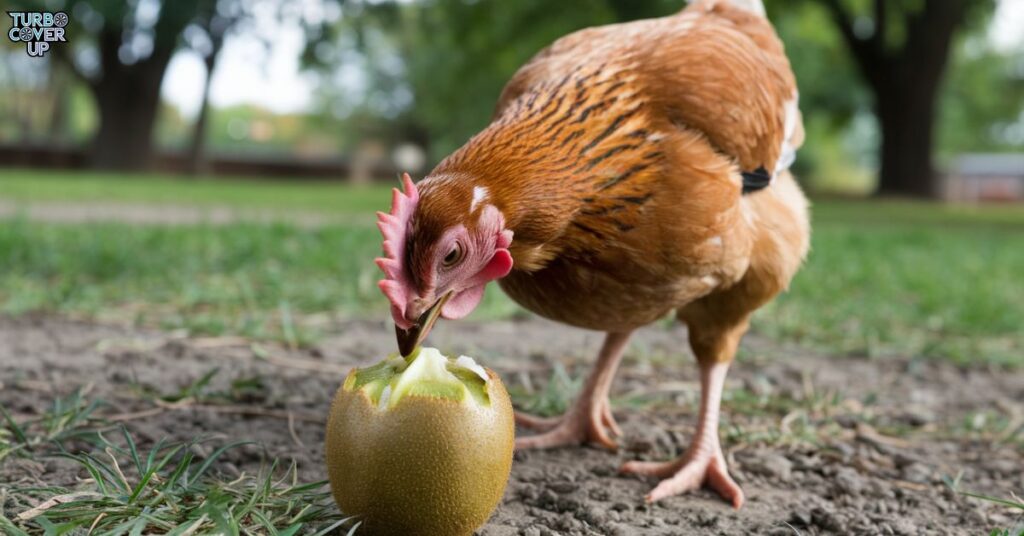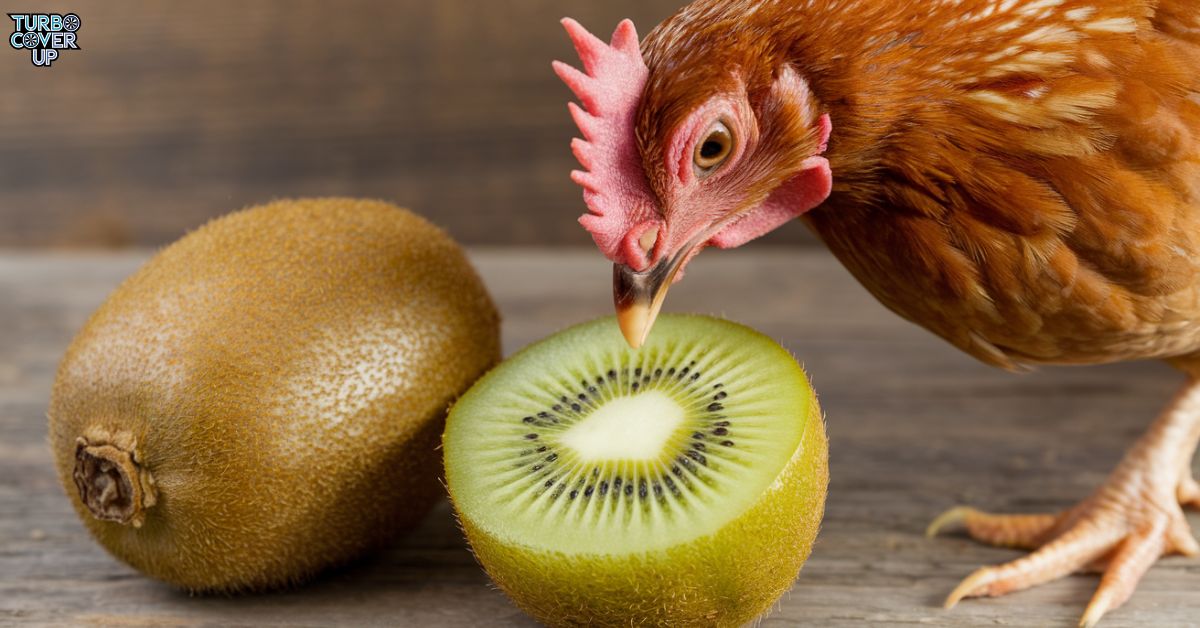Curious if chickens can eat kiwi? Kiwi is a popular fruit, packed with health benefits, but is it safe for your backyard chickens?
Let’s explore all the facts, potential benefits, and risks to help you decide if kiwi fruit is a good treat for your flock. This guide covers everything from the nutritional benefits to safe feeding practices, and potential risks.
What is Kiwi and Is It Safe for Chickens to Eat?
Kiwi, also known as kiwifruit, is a tropical fruit rich in vitamins and minerals, making it a nutritious treat for humans. But can backyard chickens eat kiwi safely? The answer is yes, but with a few important considerations.
Chickens can eat kiwi, but due to the high sugar content and acidity, it should be given in moderation. While kiwi fruit can support your chicken’s overall health, too much can lead to digestive issues.
Nutritional Benefits of Kiwi for Chickens
Feeding kiwi to chickens offers several nutritional benefits that contribute to their health and well-being. Let’s look at some of the primary nutrients in kiwi and how they benefit chickens.
Key Nutrients in Kiwi
Kiwi provides a range of vitamins, minerals, and other beneficial compounds:
| Nutrient | Benefits for Chickens |
| Carbohydrates | Provides energy to keep chickens active. |
| Protein | Supports growth and egg production. |
| Vitamin C | Boosts the immune system and aids in collagen production. |
| Vitamin K | Essential for blood clotting and bone health. |
| Vitamin E | Acts as an antioxidant and supports overall cellular health. |
| Potassium | Assists with muscle and nerve function. |
| Fiber | Promotes a healthy digestive system and improves nutrient absorption. |
| Omega-3 Fatty Acids | Supports heart health and egg quality. |
| Antioxidants | Protect against oxidative damage and oxidative stress. |
These nutrients contribute to overall health in chickens, supporting both their physical health and immune systems.
Must Read this article: Can Chickens Eat Mango?
Vitamins and Their Importance
- Vitamin C: Though chickens can synthesize their own vitamin C, additional amounts from kiwi can further strengthen their immune system, helping them fend off diseases.
- Vitamin K: This vitamin aids in blood clotting and bone health, essential for active and healthy chickens.
- Vitamin E: Known as a strong antioxidant, vitamin E in kiwi supports cellular health, helping chickens combat oxidative stress from their environment.
Minerals for Better Health
- Potassium: An essential mineral for chickens, potassium supports heart health, muscle contractions, and bone health.
- Fiber: Dietary fiber in kiwi aids the digestive system, supporting smooth nutrient absorption and preventing digestive upset.
By providing these nutrients, kiwi fruit can be a beneficial treat to support the overall health of your backyard chickens.
Feeding Kiwi to Your Chickens Safely

To ensure that feeding kiwi is both safe and beneficial, follow these guidelines on preparation and serving methods.
Selecting Fresh, Ripe Kiwi
Choose ripe kiwi with a slightly soft texture. Overripe or mushy kiwi can have higher acid levels, which may upset your chickens’ stomachs.
Proper Preparation Steps
- Wash the Kiwi Thoroughly: This helps remove any chemicals or pesticides on the surface, keeping it safe for chickens.
- Peel or Leave Skin?: While kiwi skin is edible, it’s rough and could be hard for chickens to digest. Peel the skin or chop it into small pieces if you choose to keep it on.
- Cutting for Easy Eating: Slice or mash the kiwi for easier consumption, especially for younger or smaller chickens.
Offering Kiwi with Fresh Water
Providing fresh water helps chickens handle the high sugar levels in kiwi. Chickens often become thirsty after eating sugary treats, so having water nearby helps maintain their digestive system balance.
Monitoring Chickens After Feeding Kiwi
It’s wise to keep an eye on your chickens after they eat kiwi. Look for any signs of digestive issues such as diarrhea or lethargy. Every chicken may respond differently, so observing their reaction helps you gauge tolerance.
How Often Can Chickens Eat Kiwi?
Since kiwi is a sweet, high-sugar fruit, it’s best to feed it sparingly to prevent potential digestive upset.
Recommended Frequency and Serving Sizes
Feed kiwi to your chickens about once or twice a week as a treat, not as a regular food item. For small flocks, half a kiwi per bird is usually enough. This ensures they enjoy the nutritional benefits without overloading on sugar.
Age-Specific Guidelines for Chicks and Adult Chickens
- Adult Chickens: Can handle kiwi more easily but should still be given a controlled portion.
- Chicks: Chicks have more sensitive systems, so avoid feeding them kiwi until they’re several weeks old.
Adjusting Based on Individual Tolerance
Watch your chickens’ response to kiwi, as some may tolerate it better than others. Chickens with digestive system sensitivity may benefit from other treats that are easier to digest.
Also Read: Capybara vs. Nutria
Which Parts of Kiwi Can Chickens Eat Safely?
While the fleshy part of the kiwi is safe, the seeds, skin, and rind should be evaluated carefully.
- Flesh: The juicy part of the kiwi fruit is safe and contains most of the beneficial vitamins and minerals.
- Seeds: Kiwi seeds are small and generally safe for chickens, but feed in moderation.
- Skin: Kiwi skin is edible, but its texture may be tough for chickens to chew. If left on, ensure it’s chopped small.
- Rind: The rind is tougher and not typically consumed by chickens. Avoid feeding them this part to prevent choking hazards.
Potential Risks of Feeding Kiwi to Chickens

Though kiwi can be beneficial, there are a few risks to keep in mind.
Possible Digestive Upset
The high sugar and acid levels in kiwi can lead to diarrhea or stomach issues if fed too frequently. Offering kiwi in moderation helps minimize this risk.
Allergic Reactions
Some chickens may be sensitive to kiwi, leading to symptoms like itching or swelling. Always start with a small portion and monitor for any reactions.
Choking Hazards
The skin and larger chunks can pose a choking risk. Always cut kiwi into manageable pieces to make it easy for chickens to eat safely.
Nutritional Imbalance Concerns
Overfeeding kiwi or other treats can create an imbalance in your chickens’ diet. Kiwi should be part of a varied treat rotation that includes vegetables, grains, and protein sources.
Important Considerations Before Feeding Kiwi to Chickens
Several factors can help determine whether kiwi is a good treat for your chickens.
Nutrient Balance in Overall Diet
Kiwi, while nutritious, should not replace a balanced diet. Chickens need protein and calcium-rich foods like grains, vegetables, and quality chicken feed to support egg quality and overall health.
Observing Behavioral or Physical Changes
Chickens may exhibit physical signs of discomfort if they struggle to digest kiwi. Look out for signs of digestive upset, such as lethargy or loose stool, as indicators to reduce or stop feeding kiwi.
Can Baby Chicks Eat Kiwi?
For baby chicks, kiwi may be too acidic and difficult to digest. Chicks have specific nutritional needs that are best met with chick starter feed. Consider waiting until they are several weeks old before introducing kiwi or other fruit treats.
Nutrient absorption and proper growth in chicks require a diet high in protein and vitamins designed specifically for young chickens.
Frequently Asked Questions
Do Chickens Like Kiwi Fruit?
Chickens may enjoy kiwi’s sweet taste, but individual preferences vary. Many chickens are attracted to the texture and flavor of kiwi fruit.
Can Chickens Eat Kiwi Seeds?
Kiwi seeds are safe and generally small enough not to pose a choking risk. However, like all treats, it’s best to offer them in moderation.
Is Kiwi Skin Safe for Chickens?
While the skin is edible, its rough texture can be difficult for some chickens to eat. Peeling kiwi or cutting the skin into tiny pieces is usually safer.
Can Chickens Eat Kiwi Rinds?
The rind is thicker and harder, making it challenging for chickens to consume. Avoid feeding kiwi rinds to prevent choking and digestive issues.
Conclusion
Feeding kiwi to your backyard chickens can bring many benefits when done carefully. This vibrant fruit is packed with essential vitamins like vitamin C and vitamin K, along with minerals and antioxidants that support the immune system, boost collagen production, and improve bone health.
However, keep portions moderate, as high sugar levels and acid content in kiwi can lead to digestive issues like diarrhea or stomach upset if overfed. Serving kiwi occasionally, and in small amounts, can enhance your chickens’ overall health and even contribute to better egg quality.

